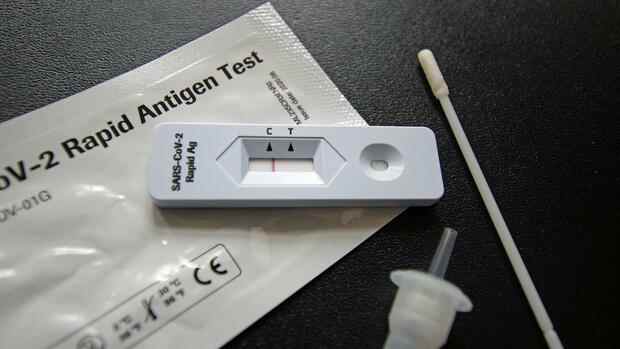Frankfurt, Zurich Customers of rapid corona tests from the Swiss pharmaceutical company Roche have to be prepared for longer waiting times. The reason for this is the strongly fluctuating demand and the global logistics chaos, Roche diagnostics boss Thomas Schinecker told the Handelsblatt. “We are completely at the limit with the antigen tests,” says Schinecker.
The company has its antigen test manufactured by the South Korean company SD Biosensor. According to Roche, more than 100 million tests can be produced per month.
However, short-term mass orders bring the company to the limit of its capacity: “There are governments that want to order 20, 30 or 40 million tests at once,” reports Schinecker. In addition, there are individual requirements for the packaging and the package insert. Therefore, Roche currently needs up to six weeks from the time the order is placed to delivery.
In addition, chaotic supply chains are slowing things down: “Getting flights these days alone is a challenge and can take several weeks,” says Schinecker.
Despite the difficulties, Roche’s diagnostics division is booming – and brought the Basel group a strong annual result. Sales grew by nine percent to 62.8 billion Swiss francs, the equivalent of around 60 billion euros, as Roche announced on Thursday.
The pharmaceutical giant was able to exceed the goals it had set itself: CEO Severin Schwan had set a low to mid-single-digit growth target.
While the drug business almost stagnated due to competition from imitation products (generics), diagnostics grew by 29 percent. With sales of CHF 17.8 billion, the test business now accounts for 28 percent of total sales. In 2020, the proportion was still 23 percent. However, the diagnostics division is still far from the profitability of the pharmaceuticals division.
Roche assures: Omikron has no influence on the test quality
According to Roch, it has provided more than 1.2 billion COVID-19 tests worldwide since the outbreak of the pandemic. This includes all three types of tests: PCR, antigen and antibody tests.
At 138 percent, the so-called point-of-care business, which includes the corona self-tests, grew particularly strongly. However, individual studies had recently raised doubts about the quality of the Roche rapid tests in the omicron wave. In addition, the test performed worse than the competition in a comparison by the Paul Ehrlich Institute.
Schinecker resolutely counters this impression: “We currently do not see that our test detects omicron infections less well.” The antigen test docks onto a region of the virus that is not mutated.
>> Read here: What Germany’s best-selling corona tests from pharmacies and trade are good for
Overall, the head of diagnostics advises taking a closer look at the study design: “If you look at individual studies that have a limited pool of patients, then you should not draw 100 percent conclusions about the overall performance of a test.” The Roche test has two Meta-analyses by the Cochrane research network with 78 studies and more than 24,000 patients and the University of Heidelberg with 74 studies and a total of more than 30,000 patients “very well”.
PCR tests provide much more reliable diagnoses. Here Roche is one of the market leaders in automated test systems. In Germany, however, many laboratories are complaining about capacity bottlenecks – some are already using a prioritization strategy to cope with the high demand.
However, Roche diagnostics boss Schinecker says that the manufacturer still has room for improvement when it comes to supplying PCR tests: “In the past few weeks we have had a rapid increase in demand for tests.” Roche has not yet reached the limit.
The group has increased its capacity more than tenfold since the pandemic and invested over 600 million Swiss francs, explains Schinecker. While two to three new production facilities would be expanded in the diagnostics division in a normal year, more than 90 production facilities have been set up and more than 1,000 employees hired in the past two years.
German laboratories at maximum capacity
According to Schinecker, the capacity problems in the German laboratories could be alleviated by installing more devices with a high level of automation. “If you want to significantly increase the number of tests, then the only way to do that is with high-throughput systems,” says the manager.
According to the current figures from the Association of Accredited Laboratories in Medicine (ALM), the approximately 180 laboratories recorded in the statistics are 95 percent utilized. In total, more than 2.4 million corona PCR tests were carried out in the past week. There are bottlenecks mainly because there is a lack of qualified personnel.
The purchase of new automated laboratory equipment is therefore not the first choice against limited capacities for ALM Chairman Michael Müller. “If politicians are aiming for an even faster and stronger expansion of capacities, laboratories from areas that lie within the direct sphere of influence and decision-making of the federal states should be more involved,” says Müller. That would be about the state laboratories for human medicine and veterinary medicine.
The diagnostics division gives the pharmaceutical company a strong annual result.
(Photo: Reuters)
However, the overloaded laboratories can hope for relief from the seasonal course of the pandemic. For the current year, Roche is preparing for the following scenario: the number of infections initially decreases in summer, but then increases again in winter.
“When we start the cold season in autumn, we will have to use tests to clarify which diseases are emerging: is it a cold, influenza or Sars-Cov-2?” says Schinecker. “And then it has to be clarified which variants are spreading and how dangerous they are.” He expects that long-term testing will also take place in Europe: “Not as much as is currently the case, but definitely more than in the past.”
More: Siemens Healthineers is raising its forecast after a strong first quarter

